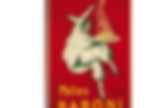

Leonard Marcus, Authority on Children's Books & Authors. 25 Books Everyone Should Read, According to TED Speakers. Back in May, just after the main TED event, the TED blog rounded up an incredible list of all the titles recommended from the stage this year.
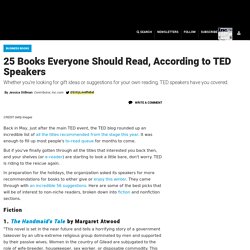
It was enough to fill up most people's to-read queue for months to come. But if you've finally gotten through all the titles that interested you back then, and your shelves (or e-reader) are starting to look a little bare, don't worry. TED is riding to the rescue again. In preparation for the holidays, the organization asked its speakers for more recommendations for books to either give or enjoy this winter. They came through with an incredible 56 suggestions. Fiction 1. By Margaret Atwood "This novel is set in the near future and tells a horrifying story of a government takeover by an ultra-extreme religious group dominated by men and supported by their passive wives. 2. UFDC Home - Baldwin Library of Historical Children's Literature.
The Baldwin Library of Historical Children’s Literature in the Department of Special Collections at the University of Florida's George A.
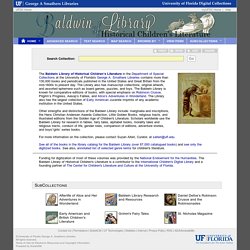
Smathers Libraries contains more than 130,000 books and periodicals published in the United States and Great Britain from the mid-1600s to present day. The Library also has manuscript collections, original artwork, and assorted ephemera such as board games, puzzles, and toys. The Baldwin Library is known for comparative editions of books, with special emphasis on Robinson Crusoe, Pilgrim’s Progress, Aesop’s Fables, and Alice’s Adventures in Wonderland. The Library also has the largest collection of Early American Juvenile Imprints of any academic institution in the United States. About Education Northwest. The Gift of Reading.
The list of what a child needs in order to flourish is short but nonnegotiable.
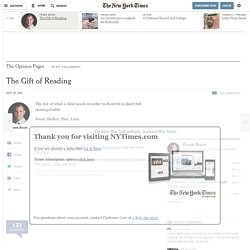
Food. Shelter. Play. Love. Something else, too, and it’s meted out in even less equal measure. Words. The Horn Book - Publications about books for children and young adults. “Nazis.
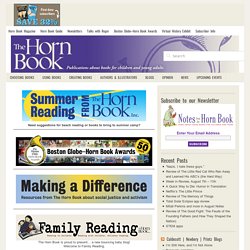
I hate these guys.” August 14, 2017 By Horn Book. Lost for words? How reading can teach children empathy. There’s no better feeling than seeing a child losing themselves in the world of a favourite fictional character.
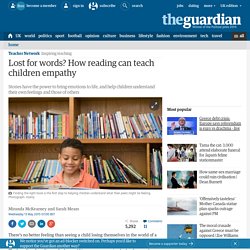
The benefits of reading go far beyond literacy: an emerging body of research highlights the power of stories to help children handle their own and other people’s feelings. A Cambridge University study by Maria Nikolajeva, professor of education, found that “reading fiction provides an excellent training for young people in developing and practising empathy and theory of mind, that is, understanding of how other people feel and think”. Neuroscience backs this up. Researchers at Emory University in Atlanta, US, say that fiction tricks our brains into thinking we are part of the story. The empathy we feel for characters wires our brains to have the same sensitivity towards real people. Empathy is increasingly being recognised as a core life skill, and the bedrock for sound relationships and classroom climate.
Pick the right books The first thing is to find the right story. Books That Bring History Into Context. As Katherine Paterson writes in “Why Historical Fiction?”
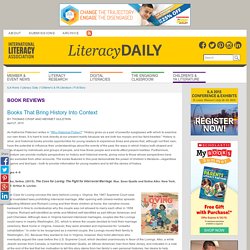
“History gives us a pair of powerful eyeglasses with which to examine our own times. It is hard to look directly at our present reality because we are both too myopic and too faint-hearted.” History is alive, and historical books provide opportunities for young readers to experience times and places that, although not their own, have the potential to influence their understandings about the events of the past, the ways in which history both shaped and was shaped by individuals and groups of people, and how those people and events affect present realities. Furthermore, literature can provide multiple perspectives on history and historical events, giving voice to those whose perspectives have been excluded from other accounts. The books featured in this post demonstrate the power of children’s literature—regardless of genre and text type—both to provide information for young readers and to tell the stories of history.
TASL Talks: Legislative and Advocacy for YOU: Self-Selected Reading as a Predictor of Reading Improvement (TLA Conference Program) By Dr.
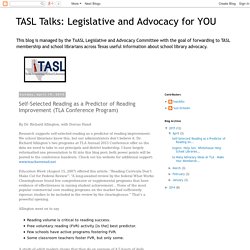
Richard Allington, with Dorcas Hand Research supports self-selected reading as a predictor of reading improvement. We school librarians know this, but our administrators don’t believe it. Dr. Richard Allington’s two programs at TLA Annual 2015 Conference offer us the data we need to take to our principals and district leadership. Education Week (August 15, 2007) offered this article: “Reading Curricula Don’t Make Cut for Federal Review”: “A long-awaited review by the federal What Works Clearinghouse found few comprehensive or supplemental programs that have evidence of effectiveness in raising student achievement… None of the most popular commercial core reading programs on the market had sufficiently rigorous studies to be included in the review by the clearinghouse.” Allington went on to say A study of adult readers shows that they do an average of 4.5 hours of daily reading, more on weekdays, more on prose than work documents, and mostly self-selected rather than assigned.